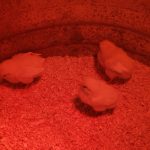The Wyoming Department of Health is reminding people that baby birds can sometimes carry harmful germs even though they may look clean and healthy. Wyoming Department of Health Surveillance Epidemiologist Matthew Peterson says there’s no denying that poultry chicks are cute and appealing, but unfortunately they can also have germs on their bodies and in their droppings. Peterson said baby poultry are a common source of Salmonella, which can cause diarrhea, fever, stomach cramps and other severe symptoms in humans. He added that some people have a severe risk for severe symptoms – young children, the elderly, pregnant women and individuals with weakened immune systems.
Peterson said there are some steps people can take to protect themselves and their families from harmful germs. He said children younger than five years of age, elderly persons or people with weak immune systems shouldn’t handle or touch chicks or other live poultry. After touching live poultry or anything in the area where they are found, wash hands thoroughly with soap and water, if soap and water aren’t available, use hand sanitizer. Don’t eat or drink around live poultry, touch with the mouth or hold closely to the face. Don’t let live poultry inside the house, in bathrooms or in areas where food or drink is prepared, served or stored. Clean equipment or materials used in caring for live poultry outside the house, such as cages or feed or water containers.
Peterson noted a different bird-related disease has been in the news lately as Wyoming is currently seeing highly pathogenic avian influenza spread among both domestic and wild birds. Bird owners should follow guidance from the Wyoming Livestock Board on preventing exposure to wild birds and should report any symptoms among their birds to their veterinarians. Hunters who handle wild birds should dress game birds in the field when possible, wear gloves when dressing birds, and wash hands with soap and water afterwards.
Last modified: April 7, 2022





